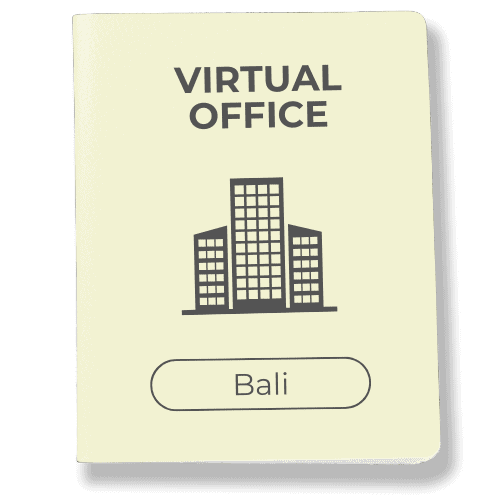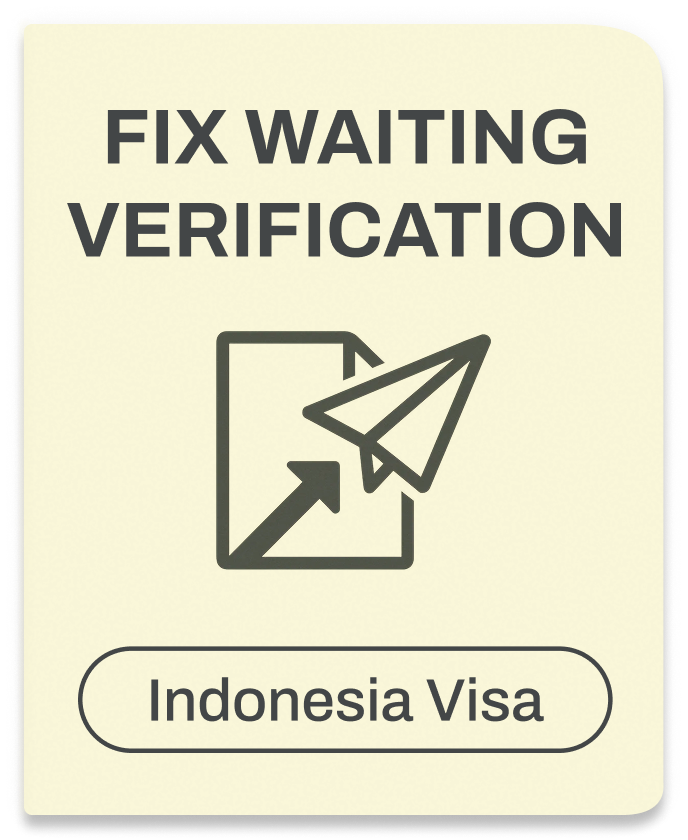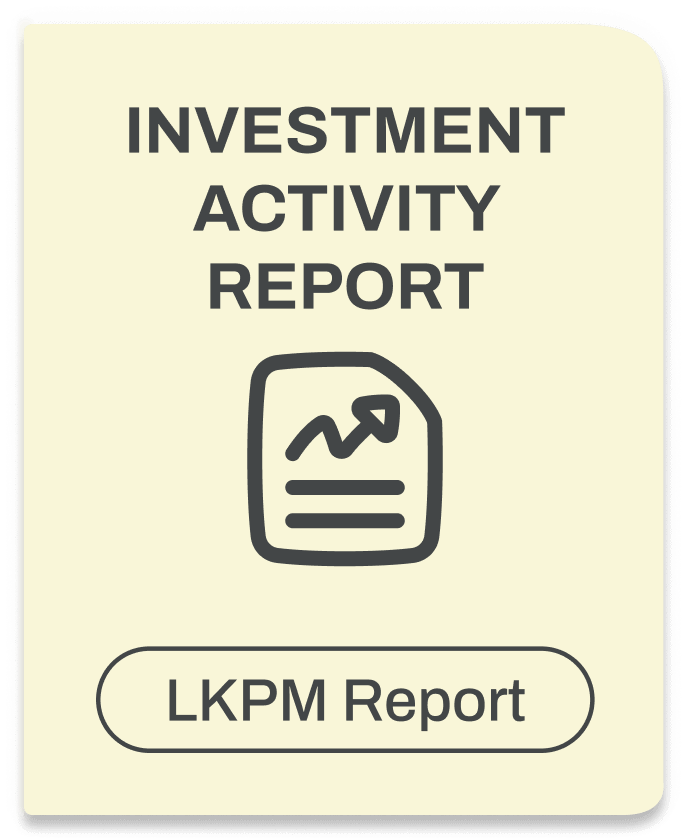Dreaming of a Bali getaway in 2025? Good news: visiting Bali just got easier, but there are some key changes you’ll want to know about first. Curious about what exactly you’ll need before stepping onto those famous beaches? Here’s your complete guide to Bali’s entry requirements for 2025.
Visa Options
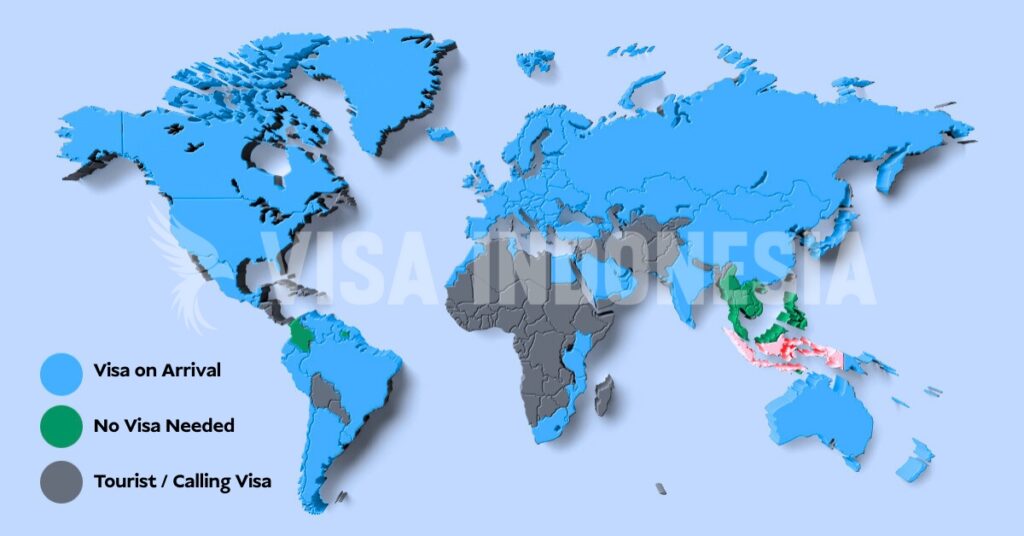
There are various Bali visa options based on the duration of your stay and the activities you plan to undertake. If you’re from one of nine ASEAN countries or Timor-Leste, you can visit visa-free for up to 30 days. Just remember that this option cannot be extended.
For foreign tourists from over 80 countries, including the United States, the United Kingdom, Canada, and Australia, the Visa on Arrival (VoA) is the most convenient option. It grants you 30 days in Bali, and if you decide you need more time, you can extend it once.
If you’d rather skip the visa application process at the airport, the Electronic Visa on Arrival (e-VOA) allows you to apply online before you travel. It provides the same stay duration and extension options as the VoA, but saves you time upon arrival.
Now, if you’re planning a longer stay, the Tourist Visa (previously called B211A, now known as C1) is your best bet. It begins with a 60-day stay and can be extended twice for an additional 60 days. This makes it a solid choice for remote workers, business travelers, and those who want to experience Bali beyond a short holiday.
If you’re unsure about which visa to apply for, you can use the Visa Recommendation Tool on visa-Indonesia.com to find the best option.
Passport Validity & Proof of Onward Travel
Getting into Bali isn’t complicated, but it does require the right paperwork. You don’t want to be that traveler scrambling at immigration because you missed an important detail!
1. Valid Passport
Indonesia has a strict rule regarding passport validity. Your passport must be valid for at least six months from the date of your arrival, with no exceptions. If your passport expires soon, don’t risk it. Airlines won’t let you board if your passport doesn’t meet this requirement.
2. Onward Travel Ticket – Do You Need One?
Yes. You may be asked to prove you’re leaving Indonesia before your visa expires.
- This could be a return flight or a ticket to another country.
- Some airlines will not let you check in without one, even if immigration doesn’t ask.
If you’re unsure about your travel plans, consider booking a refundable ticket or using a temporary onward ticket booking service to meet this requirement.
Indonesian Immigration Checklist: What You Need at the Airport
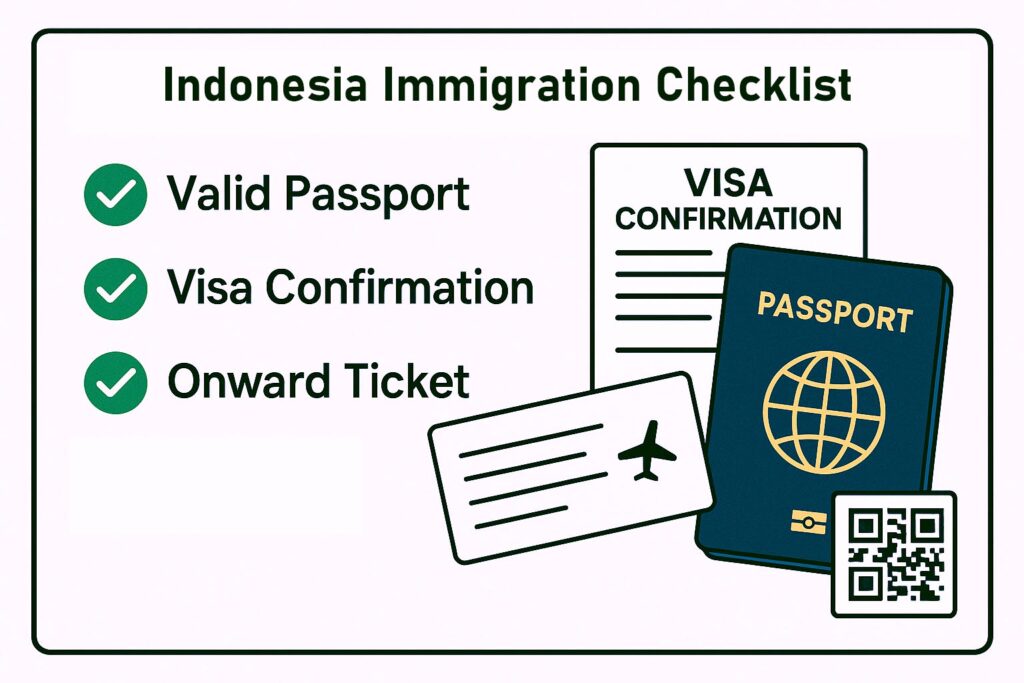
To speed up your arrival, make sure you have these ready to go before you land:
✅ Your passport (valid for at least six months)
✅ Visa confirmation (if you applied for an e-VOA or C1 Tourist Visa)
✅ Proof of return or onward travel (a flight ticket out of Indonesia)
✅ Proof of travel insurance (not always mandatory, but highly recommended)
Customs Form: Fill It Out in Advance
Indonesia requires all travelers to complete a digital customs declaration before arrival. This step helps speed up the customs process and makes entering the country much easier.
- Complete the form online at https://ecd.beacukai.go.id before your flight.
- After submitting, you’ll receive a QR code—save it to your phone or print it out.
- Show the QR code at customs upon arrival for a seamless entry.
Filling out the form in advance means less waiting at the airport and a smoother start to your Bali adventure.
What to Expect at Bali’s Airport (Ngurah Rai International Airport)
After your flight, you’ll go through three main steps:
Step 1: Immigration
- Present your passport, visa, and onward ticket.
Step 2: Baggage Claim & Customs
- Collect your bags and proceed to the customs inspection.
- If you declared any items online, have your QR code ready.
Step 3: Getting to Your Hotel
- Avoid unofficial taxis offering rides at the airport exit.
- Use Grab, Gojek, or the official airport taxi counter to get fair rates.
- If you pre-booked transport, your driver will be waiting with a sign.
Travel Insurance and Medical Coverage
Having comprehensive medical insurance is strongly recommended for all travelers visiting Bali. Your insurance should cover overseas medical costs, including medical treatment, hospitalization, and medical evacuation in the event of a serious illness or injury.
Before traveling, confirm that your policy provides full coverage for Indonesia and includes:
- Emergency medical expenses (hospitalization and treatment)
- Medical evacuation (transportation to a hospital in case of a severe medical emergency)
- COVID-19 coverage (in case policies change)
Without travel insurance, you could face high out-of-pocket medical costs, especially if you need emergency care or hospitalization.
Customs & Prohibited Items in Indonesia
When traveling to Indonesia, understanding the customs regulations and prohibited items is crucial. Failing to comply with these rules can result in fines, confiscation of goods, or even severe legal consequences. This guide will help you navigate Indonesia’s customs declaration process, avoid prohibited items, and ensure smooth entry and exit.
Completing Your Customs Declaration
Every traveler entering Indonesia is required to complete a customs declaration form. This document lists the items you are bringing into the country and helps authorities enforce import regulations. To make the process easier, Indonesia offers an electronic customs declaration form (E-CD). This can be completed online before your arrival, reducing wait times at the airport. Here’s how:
- Fill out the form online, available on the Indonesian Directorate General of Customs website.
- Provide accurate details, including cash over IDR 100 million (~$6,500 USD), high-value items, or restricted goods.
- Save a digital or printed copy to show customs officials upon arrival.
For travelers who don’t complete the form online, paper versions are still available at immigration checkpoints.
Prohibited & Restricted Items
Indonesia has strict regulations regarding what can and cannot be brought into the country. Below are the key categories of prohibited and restricted items:
Strictly Prohibited Items
Bringing these into Indonesia can lead to imprisonment, fines, or deportation:
Illegal Drugs & Narcotics – Indonesia has some of the strictest drug offences laws in the world. Possession, use, or trafficking of any illegal drugs can result in a death sentence or life imprisonment. Even small amounts can result in severe consequences.
Cannabis-Based Products – Even if they are prescribed in your home country, CBD oils, cannabis edibles, and medicinal marijuana are completely illegal in Indonesia. Avoid carrying them at all costs.
Firearms, Explosives, & Sharp Weapons – Bringing any kind of firearm, ammunition, or large knives requires special government permission.
Pornographic Materials – Indonesia bans explicit materials, including some types of magazines, films, and digital content.
Certain Medications – Some prescription drugs that are legal elsewhere may contain banned substances in Indonesia. Seek advice from the Indonesian embassy before traveling with any strong painkillers, sedatives, or ADHD medication (e.g., codeine, morphine, Ritalin).
Restricted or Limited Items
Some items can be brought in, but only in limited quantities or with special approvals:
- Cash Over IDR 100 Million (~$6,500 USD) – Must be declared at customs.
- Tobacco & Alcohol – Travelers can bring:
- 200 cigarettes, 25 cigars, or 100g of tobacco.
- 1 liter of alcoholic beverages.
- Electronic Devices & Professional Equipment – If you carry high-end cameras, drones, or sound equipment, customs officers may ask for import duty fees or require special permits.
- Cultural Artifacts & Endangered Wildlife Products – Exporting antiques, traditional crafts, or animal products (like ivory or coral) without permission is illegal.
Exit Requirements: What You Need to Declare
Before you leave Indonesia, be aware of the following export restrictions:
- Cultural & Religious Artifacts – Avoid buying or trying to export sacred Balinese relics, temple statues, or traditional textiles without proper documentation.
- Wildlife & Plant Products – Items like exotic wood carvings, rare shells, or plants may be subject to export bans.
- Large Sums of Cash – If you are taking more than IDR 100 million (~$6,500 USD) out of Indonesia, you must declare it.
What to Do If You’re Unsure?
If you’re not sure whether an item is allowed, it’s best to seek advice before your trip:
- Check the Indonesian Directorate General of Customs website for up-to-date import/export rules.
- Contact the Indonesian Embassy or Consulate in your country if you have questions about medication, valuables, or other restricted items.
- Ask your airline or travel provider for guidance on what can be carried in checked vs. carry-on baggage.
Local Laws, Etiquette & Safety
After clearing customs, you’ll officially be in Bali! However, before you begin exploring, it’s essential to familiarize yourself with the local laws and customs.
Respecting Bali Etiquette and Local Culture
Bali’s rich traditions and customs shape everyday life on the island. Understanding and respecting local culture enhances your experience and shows appreciation for the Balinese way of life.
When greeting locals, a warm smile and a slight bow with hands pressed together in the sembah gesture are customary. Always use your right hand when giving or receiving something, as the left hand is considered impolite. Dress modestly when away from the beach, and when visiting temples, ensure your shoulders and knees are covered. A sarong and sash are often required, and some temples provide these at the entrance.
You may also notice certain trees wrapped in black-and-white checkered cloths. These sacred trees hold spiritual significance, and climbing or touching them is considered a disrespectful act. Always observe posted signs and follow local guidelines to honor these customs.
Understanding Local Laws and Regulations
Indonesia has strict laws, and some regulations may differ from those in your home country. Being aware of these laws can help you avoid serious consequences during your stay.
The legal drinking age in Indonesia is 21, and identification may be required at bars or nightclubs. Drug laws in Indonesia are among the strictest in the world, with severe penalties, including lengthy prison sentences and the death penalty. Avoid any involvement with illegal substances.
Specific sites prohibit photography due to religious or cultural sensitivities. Always obey signs banning photography, especially at temples, ceremonies, and government buildings. Respecting these rules helps preserve the dignity of these sacred spaces and avoids potential fines or conflicts with local authorities.
Bali has recently introduced a tourist levy, also referred to as the Bali tourism levy, which requires foreign travelers to pay a fee upon arrival. This tax supports environmental conservation and cultural preservation efforts on the island. Check for the latest fee structure before your trip.
Safety Considerations: Natural Disasters and Emergencies
Bali is located in an area prone to natural disasters, including earthquakes, active volcanoes, and tsunamis. Being prepared and staying informed about potential risks can help you stay safe.
Volcanic activity is an ongoing risk, particularly from Mount Agung and Mount Batur. Eruptions can occur with short notice, affecting travel plans and flight schedules. Always check official warnings before planning a trip to mountainous regions.
Earthquakes and subsequent tsunami warnings are also possible in Bali. If you’re staying near the coast, familiarize yourself with evacuation routes and heed all emergency instructions from local authorities.
Although rare, terrorist attacks have occurred in Indonesia in the past. Stay updated on security alerts through official government channels and exercise caution in crowded places or tourist-heavy areas.
Engaging with Local Authorities and Law Enforcement
Bali’s local police and authorities are responsible for enforcing the criminal code and maintaining safety for both residents and tourists. It’s important to cooperate with them if approached for routine checks or in case of an emergency.
Carrying a copy of your passport and visa is recommended, as local authorities may conduct random checks. If you need assistance, contact your country’s embassy or consulate for guidance.
Arrival & Getting Around

Stepping off the plane after a long flight can be overwhelming, especially in a bustling place like Bali’s Ngurah Rai International Airport. Wondering about taxi scams or how to pick a safe ride? How do ride-sharing apps work locally?
We’ve compiled tips to help you navigate the airport chaos, find your way around easily, and start your holiday stress-free.
Arriving at Bali Airport
Arriving at Bali Airport (officially known as Ngurah Rai International Airport) is pretty straightforward, even if it’s your first time. Once you land, you’ll follow signs that clearly direct you through immigration, baggage claim, and customs. For international flights, ensure you’ve completed any arrival forms provided by your airline prior to departure. This makes the whole process faster.
Navigating the Arrivals Hall
After customs, you’ll enter the arrivals hall, where you’ll find tons of helpful airport information. There is a tourist information counter located right in the arrivals area. If you have questions about local transport, directions, or general tips for your trip, this is a great spot to ask, the locals and staff are happy to assist.
If you’ve pre-booked a transfer with your hotel or a travel provider, look around for someone holding a sign with your name on it. This can be a stress-free way to check into your hotel rooms quickly, especially after a long flight. If you’re arranging your own ride, stick to the official taxi desk to avoid any hassle.
Getting Around Bali
Now, let’s talk about getting around. Bali’s roads are bustling, and traffic can be intense. Renting a scooter is common, but here’s a heads up: You need an international driving permit. If you’re traveling with a family member or prefer a relaxed ride, Grab and Gojek are the go-to ride-hailing apps in this area. Just remember that some areas have restrictions on pickup, especially around tourist-heavy zones.
Public Transport & Private Drivers
As for public transport, it’s pretty limited. There are local buses, such as the Trans Sarbagita service, but these don’t reach everywhere. Most travelers find private drivers or taxis to be a more comfortable way to explore. Ask your travel provider or hotel for recommendations to score reliable, friendly drivers who often double as informal tour guides.
Don’t Forget Travel Insurance
Lastly, a quick tip: don’t overlook travel insurance! Whether you misplace luggage, have flight delays, or face unexpected medical needs, it’s a small price to pay for peace of mind while exploring Bali.








